Lewis Hamilton's F1 prowess is under threat from Nico Rosberg
- Published
- comments
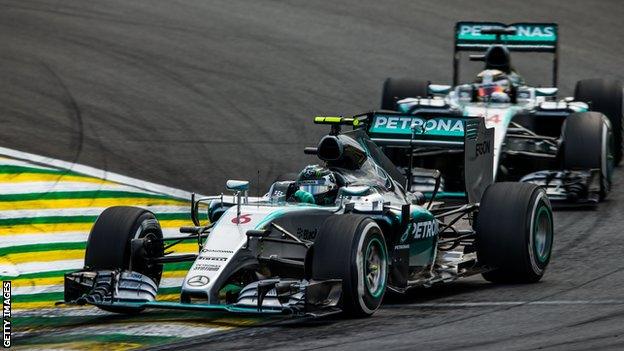
Six races to go; eight points in it between Lewis Hamilton and his Mercedes team-mate Nico Rosberg. And a genuine uncertainty about who will end up as this year's Formula 1 world champion.
For most of the season, through dramatic swings of momentum between the two drivers, there has been a general assumption in F1 that Hamilton would eventually come out on top and win a third consecutive title - and a fourth overall.
But the last race in Singapore has solidified some uncomfortable questions for Hamilton, and given Rosberg the appearance of a more steadfast and serious rival than he had perhaps previously been given credit for.
Hamilton is a mercurial character, and has always had his ups and downs. But Singapore was something else. Rosberg utterly dominated the weekend, more convincingly than he ever has before. And Hamilton appeared lost.
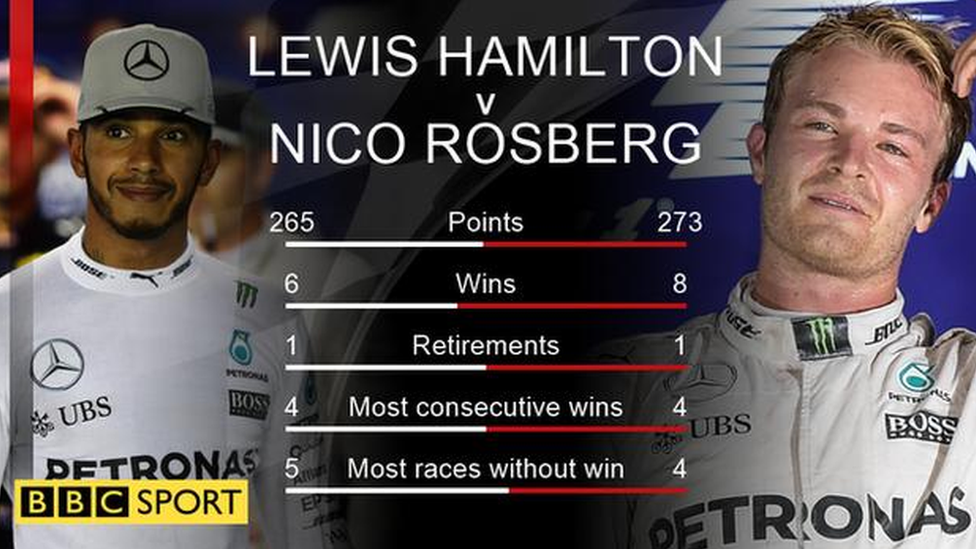
Mercedes F1 boss Toto Wolff said the team had "failed" Hamilton in not finding a suitable set-up for the car, largely as a result of limited track time after a number of problems.
But Hamilton's post-race remarks sounded like a mea culpa. And whatever the root of the problems, it was especially terrible timing for Hamilton to have a bad weekend in Singapore, where Mercedes faced their stiffest opposition from rivals since Monaco back in May.
Normally, even on a bad weekend, Hamilton could have expected to finish second to Rosberg, and lost only seven points. But in Singapore he ended up third, behind Red Bull's Daniel Ricciardo, and lost 10 - and would have been beaten by Kimi Raikkonen as well were it not for a strategy miscalculation by Ferrari, who unnecessarily responded to Hamilton's late extra pit stop.
Even such small margins could be crucial in a season as competitive as this has become.
Statistics in Rosberg's favour
There are statistical reasons to believe that this could be Rosberg's year.
For a start, no driver who has won the first four races - as Rosberg did - has ever gone on to lose the championship in that season.
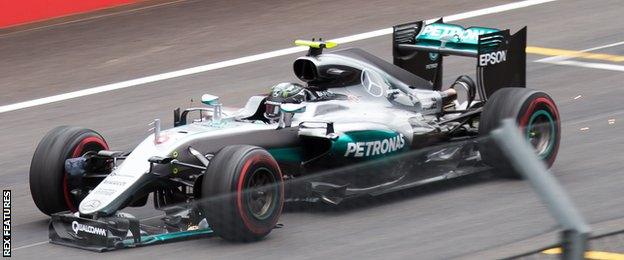
What's happened here, then? Rosberg trundled over the line in Austria after crashing into Hamilton on the final lap. Not his finest hour...
Equally, Singapore was Rosberg's eighth win of the year, while Hamilton 'only' has six. Again, no driver who has won eight races has ever lost the championship.
Of course, Hamilton can turn that around in the remaining races, but it is striking how different that statistic is from the last two seasons, over the course of which Hamilton more or less won twice as many races as his team-mate - 11-5 in 2014 and 10-6 in 2015.
At the same time, Rosberg drove probably the race weekend of his life in Singapore, which can only have strengthened his belief that he can finally do it this time.
Clawing back - and then letting go again
Hamilton has repeatedly this season referenced the problems he had early in the year which put him on the back foot - "given where we've come from", "I still feel like I'm chasing" etc.
Specifically, these were the identical failures of the MGU-H - the part of the engine's hybrid system that recovers energy from the turbo - in qualifying at the Chinese and Russian Grands Prix, which put him down the grid.
These gifted two further wins to Rosberg after the two he had taken in the opening races in Australia and Bahrain, in which Hamilton had surrendered pole position with poor starts.
The technical failures had a knock-on effect further down the line, in that Hamilton knew he would face another weekend starting at the back as Mercedes were penalised for taking the extra engine parts he would need to finish the season. This duly happened in Belgium at the end of August.
What has been remarkable about Hamilton's season - and what only strengthened the belief in his inherent superiority over Rosberg - was the way he recovered from the early season blows.

That crash in Spain, which led to Max Verstappen's maiden win in his first race for Red Bull


He was 43 points behind after those first four races - which became five races when the two Mercedes drivers crashed into each other on the first lap of the Spanish Grand Prix.
Remarkably, over the next seven grands prix, Hamilton turned that deficit into a 19-point advantage - a swing of 62 points - with six wins.
But here's the thing. Hamilton wiped out Rosberg's early advantage. Yet still he finds himself behind again - and he can only blame himself.
Even in that mid-season run, there was a warning sign. In Baku, Hamilton was stunningly fast, but drove a shockingly poor qualifying session, a series of mistakes leading to a crash that left him 10th on the grid.
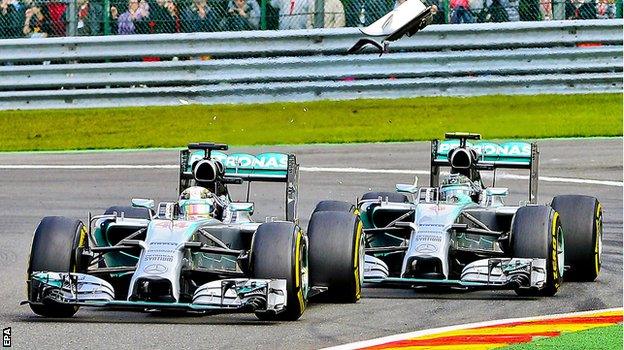
They've got previous: Hamilton and Rosberg collided during the 2014 Belgian GP, which led to heated team meetings after the race
Trying to recover in the race, he spent many laps trying to work out how to solve an engine settings problem which Rosberg solved in half a lap when the same thing happened to him during the race.
There were extenuating circumstances - Rosberg had only just moved into the errant mode when the problem occurred for him; Hamilton had been in the setting since the start of the race. But even so, some believe Hamilton might have worked it out sooner, regardless of the complexities of the current cars, which have more than 100 engine settings on the steering wheel.
How has Hamilton ended up behind again?
Baku was a blip in a sublime run that saw Hamilton heading into the mid-season summer break in an apparently luxurious position.
Yet three races later, he is behind again - this time following a 27-point swing to Rosberg.
Ironically, most of the damage was not done as a result of the engine penalty in Belgium. There, Hamilton recovered to finish third from the back of the grid, leading Rosberg to look at the results after winning the race and say to himself: "Hamilton third? What, seriously?!"
Instead, it came in the next two races - in Italy, where Hamilton was dominant in qualifying only to throw away a seemingly inevitable victory with another poor start and drop to sixth on the first lap, from where he recovered to second; and then in Singapore.
Rosberg on the rise
Now, you can say that Rosberg was gifted the wins in China, Russia and Belgium because of Hamilton's problems, and you'd be right.
You can add that Hamilton has had by far the worse of Mercedes' technical problems this year, and you'd also be right.
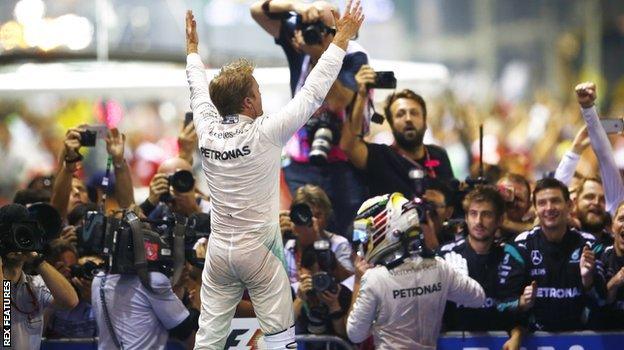
Hamilton appeared lost in Singapore, Rosberg more assured than ever before
The only major issues to affect Rosberg so far were a gearbox change that dropped him five places on the grid in Austria, and the gearbox glitch that led to a penalty for breaking radio transmission rules that demoted him to third from second at Silverstone.
And you can say that, by the law of averages, Rosberg is due another problem before the end of the year.
But only if you are especially partial to Hamilton can you make a dismissive argument about any of Rosberg's other victories. And to do so wouldn't be fair.
No matter how fast he is, it's a racing driver's responsibility to get his car off the line, so Rosberg's Australia, Bahrain and Italy wins were fair and square.
And Rosberg has had his own bad starts, too. Three to Hamilton's four, to be precise, two of which were when he was on pole in Hungary and Germany, and which gifted Hamilton the lead and subsequent victory.
The same goes for Baku - it's no good being the fastest bloke in all the sectors, if you can't complete a lap without throwing it off the track.
So, what now?
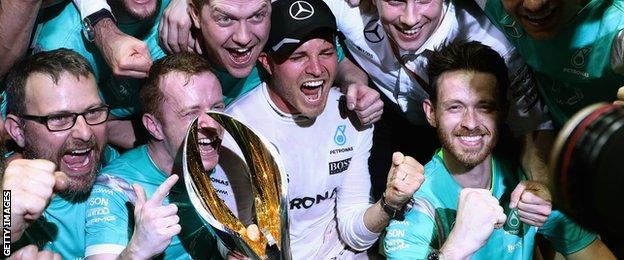
8 ball: Rosberg has won eight races this season - no driver has ever failed to win the title having won eight races
There is no doubt that, overall, Hamilton is the faster and better racing driver. But what has impressed about Rosberg this season is his fortitude and ability to just hang in there and keep delivering the results, seemingly impervious to outside pressures.
"It's my best approach," he told this writer after winning in Italy. "Because if I think about 43 points [ahead] going to 19 [behind] I would lose sleep over that. So I just don't think about it and enjoy winning the races."
Two weeks later, in Singapore, he simply wiped the floor with Hamilton.
All this has made an impression on Rosberg's rivals.
Last week, Ricciardo was asked in an Australian television interview who he thought would win the title.
"When Lewis made up that deficit to Nico and came back it was like, OK, nobody's going to touch Lewis," he said. "[But] Nico's come back. I'm going to throw a spanner in the works and say Rosberg."
If Hamilton is going to stop that happening, he needs to start winning a lot more races, preferably starting in Malaysia this weekend. And he almost certainly cannot afford any more weekends like Singapore.
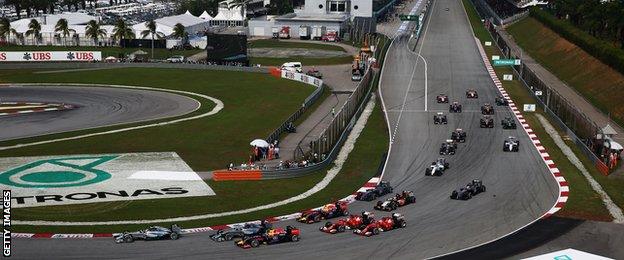
Next up is the Malaysian Grand Prix - live on the BBC Sport website and 5 live
- Attribution
- Published21 September 2016
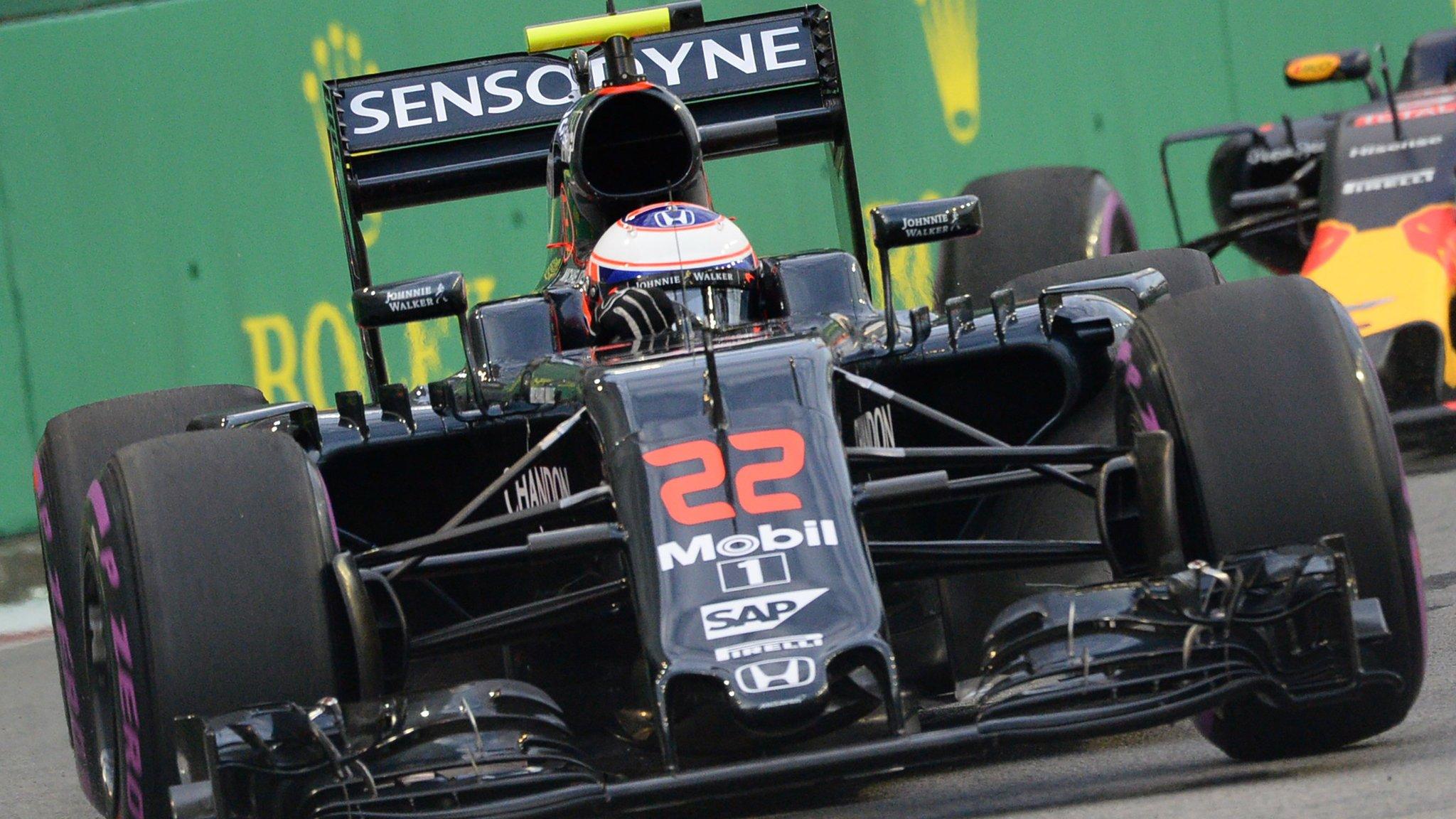
- Published23 September 2016
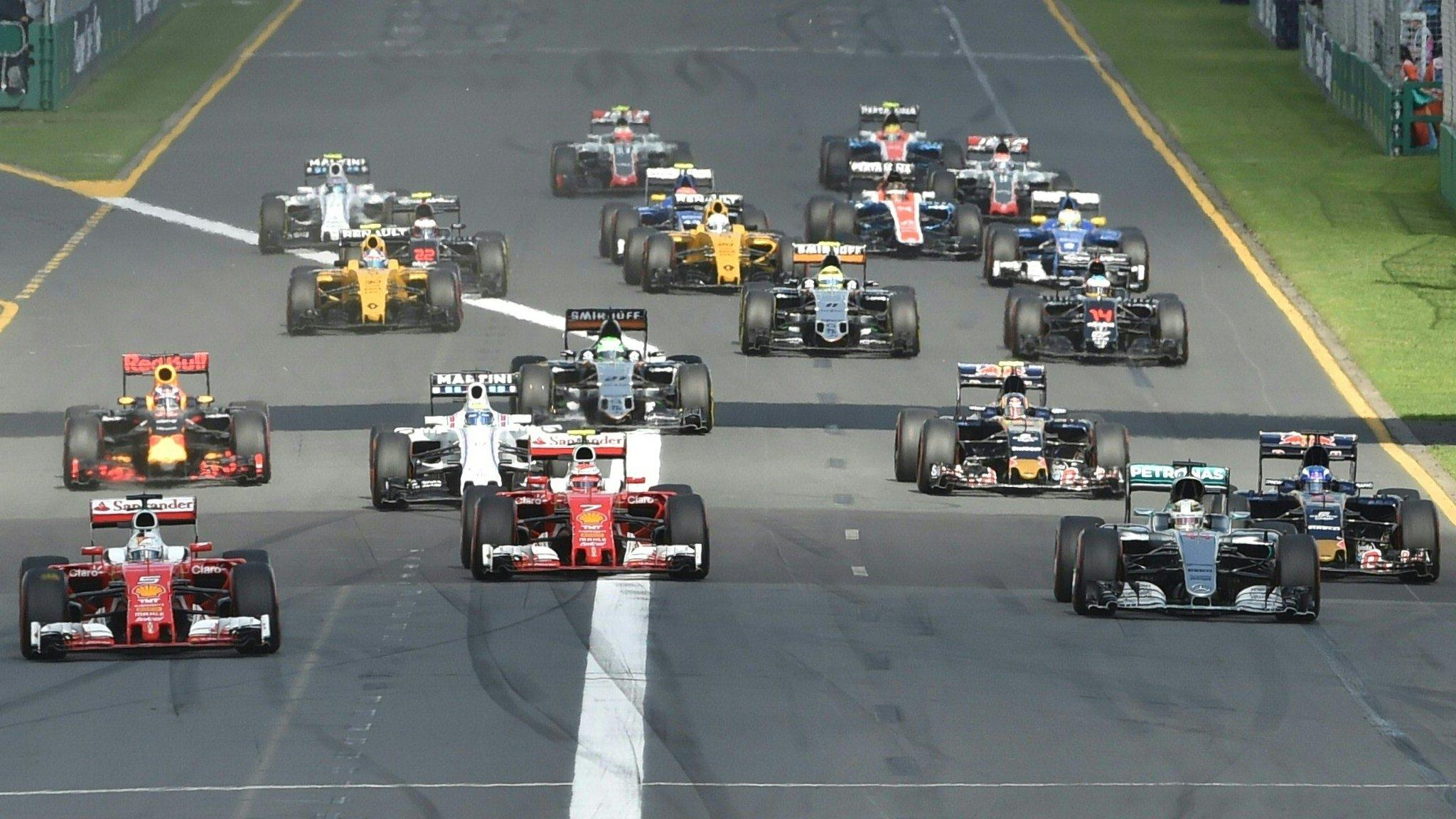
- Published19 September 2016
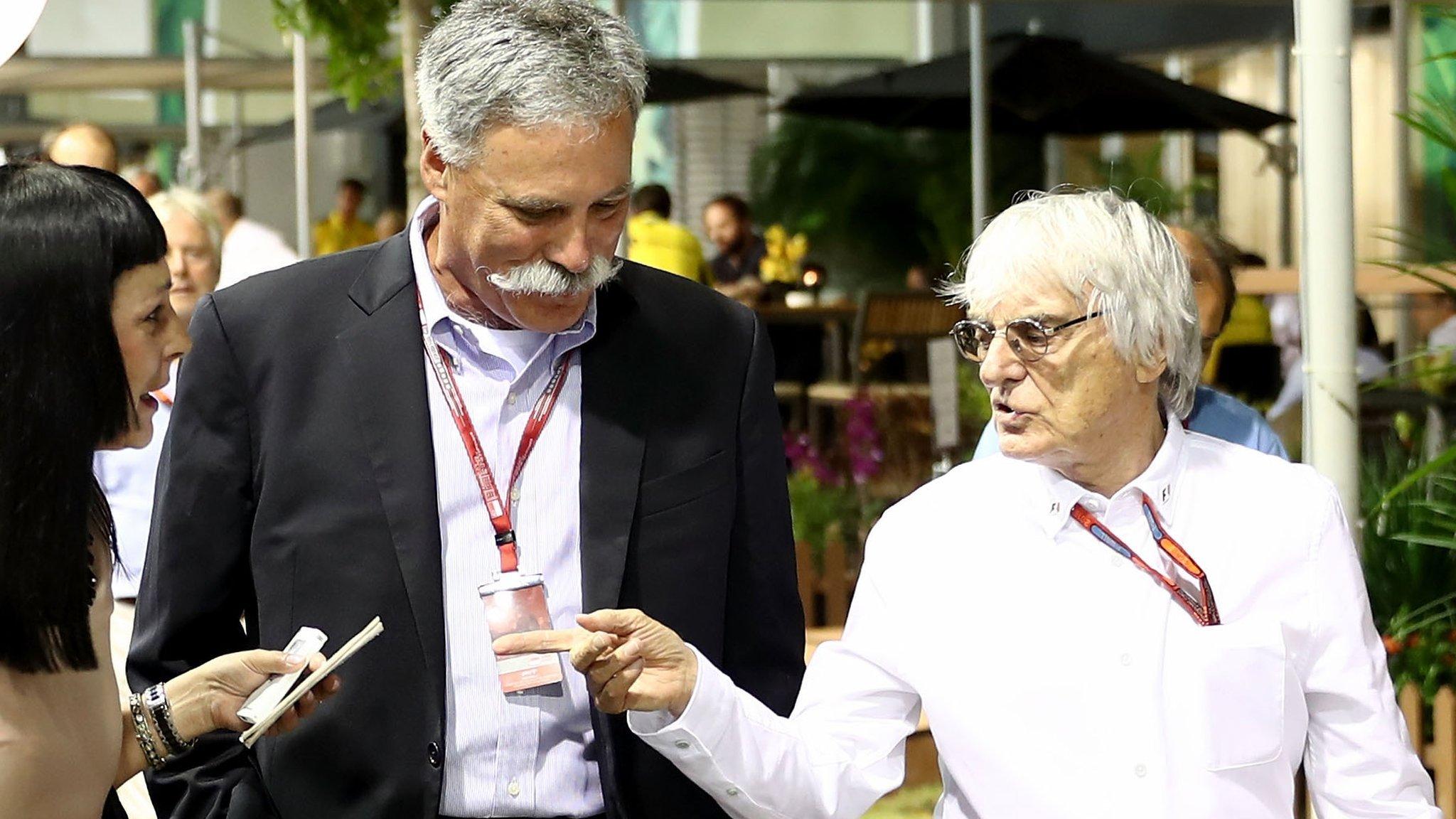
- Published18 September 2016
- Attribution
- Published19 September 2016
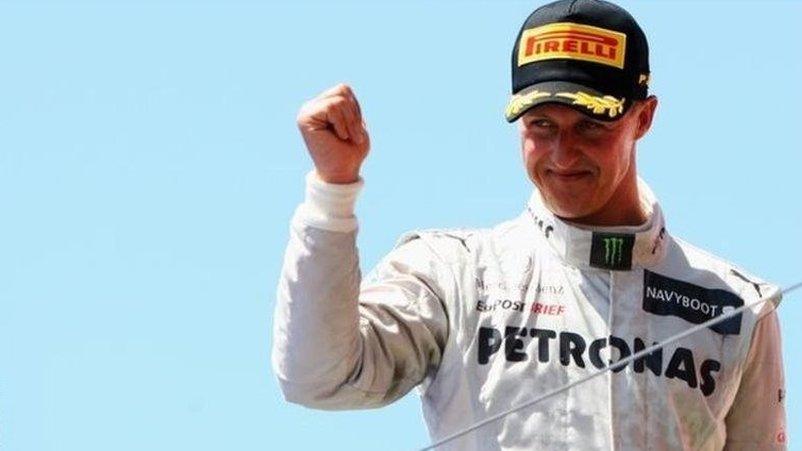
- Published18 September 2016
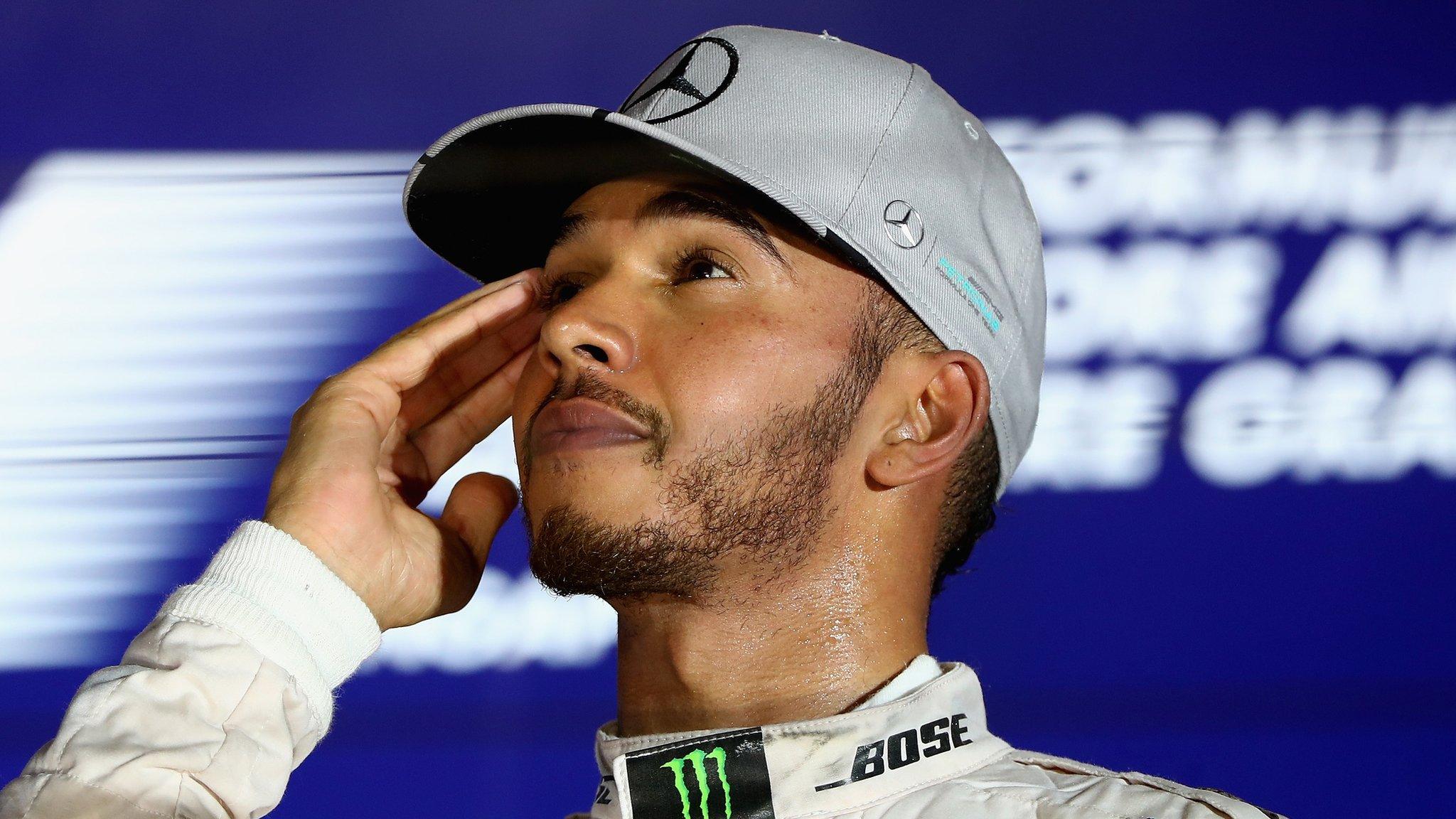
- Published18 December 2015

- Published8 August 2017

- Published13 May 2016

- Published26 February 2019
